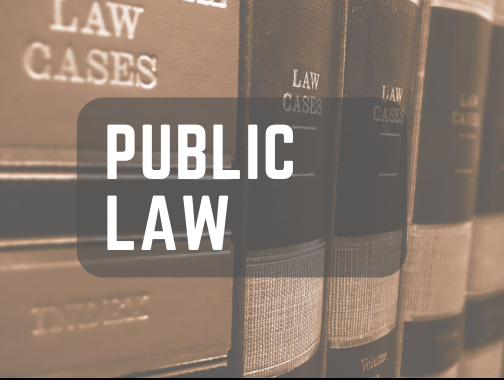Public Law examines how the legal system, of which the constitutional order and judiciary are integral parts, governs the relationship both among constituent units of the state and between citizens and the state. It also examines the obligations that states have to one another via international law. Courses in our curriculum address the normative foundations of principles of justice and human rights; the role of constitutions and courts in safeguarding the rule of law, protecting civil liberties, and curbing state power; the constraints to state sovereignty posed by international law and international courts; and the implications of the legal order for democratic and legitimate policy-making.
The Programs in Public Law introduce students to theories and applications of law with a particular focus on the mobilization of diverse minority groups. At the introductory level, courses highlight the way that the struggle for racial equality and justice have had a formative impact on both law and politics. The Department of Political Science offers courses on social movements and human rights, which foreground the experience of domination and the role of ethnicity, race, gender and social class in resistance and collective empowerment, in Canada and beyond. Advanced applications courses also highlight the limits of legal change and legal reasoning. These courses explain the social forces of prejudice, stereotyping, discrimination and racism. The curriculum is designed to expose students to a wide range of issues related to equity, including labour-union organizing, immigrant incorporation; racial bias in policing; indigenous land rights; sexual diversity; gender equality; and community building and mobilization.
2024-2025 Calendar description
Program Offerings
Major Program in Public Law
The Major in Public Law is four-year undergraduate program rooted in the foundations of social science and intended for students with an interest in interdisciplinary education that explores the way that public law is relevant to major themes in political science and sociology. Students will acquire in-depth understanding of theories of rights and justice, and the institutions and social movements that have helped realize these ideals. Courses in the program address the normative foundations of justice and human rights, and the role of constitutions and courts in safeguarding the rule of law, protecting civil liberties, and curbing state power.
The program focuses on developing students’ research, writing, and oral presentation abilities, as well as exposing them to the role that public law plays in our community through experiential learning. Upon graduation, students will be prepared to take up further academic study, including graduate study in political science or sociology, or professional training at law school or in paralegal studies.
Enrolment Requirements
Enrolment in the Major is limited. Students may apply after completing 4.0 credits and must have achieved a minimum CGPA of 2.0. Students who have completed 10.0 or more credits are not eligible. Submission deadlines follow the Limited Enrolment Program Application Deadlines set by the Office of the Registrar each year. Failure to submit the program request on ACORN will result in that student’s application not being considered. Admission to the proposed Major will be assessed through a consideration of the student’s academic performance.
Please note that students will be able to request the Major Program in Public Law beginning Winter 2025.
Minor Program in Public Law
The Minor Program in Public Law complements the Specialist, Major and Minor programs in Political Science. The primary learning goals of the program are to introduce students to the study of public law and to understand how to investigate how the legal system, of which the constitutional order and judiciary are integral parts, governs the relationship both among constituent units of the state and between citizens and the state. Similar to other program in the department, the Minor Program in Public Law develops students’ communication, reading and writing skills in the core B-level courses: POLB30H3, POLB56H3 and POLB57H3. Additionally, the core C-level course, POLC32H3, provides students with the opportunity to enhance students’ knowledge of the plural epistemologies and methodologies of political science/social science – including methods of legal reasoning and justification—and awareness of their limitations. Students also further develop their interdisciplinary thinking, social activism, and professional training skills depending in the various C-level courses they select to complete the public law elective requirement for the program.
The Minor Program in Public Law introduces students to theories and applications of law with a particular focus on the mobilization of diverse minority groups. At the introductory level, courses highlight the way that the struggle for racial equality and justice have had a formative impact on both law and politics. The Department of Political Science offers courses on social movements and human rights, which foreground the experience of domination and the role of ethnicity, race, gender and social class in resistance and collective empowerment, in Canada and beyond. Advanced applications courses also highlight the limits of legal change and legal reasoning. These courses explain the social forces of prejudice, stereotyping, discrimination and racism. The curriculum is designed to expose students to a wide range of issues related to equity, including labour-union organizing, immigrant incorporation; racial bias in policing; indigenous land rights; sexual diversity; gender equality; and community building and mobilization.
Competencies & Skills Learned in the Public Law Program
- An understanding of the law in its broader context
- The ability to analyze issues from a variety of perspectives
- Critically analyze problems, think creatively and make decisions while considering different sides of an argument
- Understand social issues and their relation to contemporary legal question
